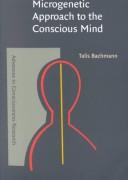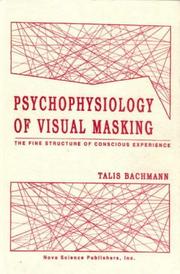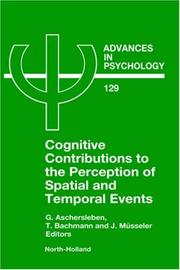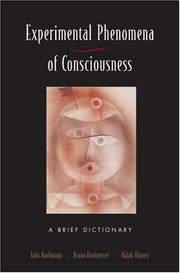| Listing 1 - 10 of 13 | << page >> |
Sort by
|
Book
ISBN: 0128095059 0128093110 9780128095058 9780128093115 Year: 2016 Publisher: Amsterdam
Abstract | Keywords | Export | Availability | Bookmark
 Loading...
Loading...Choose an application
- Reference Manager
- EndNote
- RefWorks (Direct export to RefWorks)
Perception of Pixelated Images covers the increasing use of these images in everyday life as communication, socialization, and commerce increasingly rely on technology. The literature in this book is dispersed across a wide group of disciplines, from perception and psychology to neuroscience, computer science, engineering, and consumer science. The book summarizes the research to date, answering such questions as, What are the spatial and temporal limits of perceptual discrimination of pixelated images?, What are the optimal conditions for maximizing information extracted from pixelated images?, and How does the method of pixelation compromise or assist perception? Integrates research from psychology, neuroscience, computer science, and engineering Explains how the process of perception works for pixelated images Identifies what assists and hinders perception, including the method of pixelation Discusses the limits of perception of pixelated images--
Three-dimensional imaging. --- Digital images. --- 3-D imaging --- 3D imaging --- Three-dimensional imaging systems --- Three-dimensional imaging techniques --- Three-dimensional visualization --- Visualization, Three-dimensional --- Imaging systems --- Digitized images --- Images, Digital --- Pictures

ISBN: 1282163957 9786612163951 9027299897 9789027299895 9781282163959 1556198418 9781556198410 1556198418 9027251452 Year: 2000 Publisher: Amsterdam Philadelphia John Benjamins Pub. Co.
Abstract | Keywords | Export | Availability | Bookmark
 Loading...
Loading...Choose an application
- Reference Manager
- EndNote
- RefWorks (Direct export to RefWorks)
Many secrets of nature have been discovered since we have a better understanding of microstructures, for example subatomic spheres in physics and genetic structures in biochemistry. This book is set to convey an overview of the history, methods, findings and theoretical accounts of microgenetic research in consciousness and experimental psychology. The reader will find information about how conscious percepts unfold within only a fraction of a second. In a sense, and according to the microgenetic hypothesis, our subjectively experienced perceptual image undergoes formation similar to the process of developing a photograph. Yet the time scale of the awareness-related perceptual development is much finer and therefore accessible only to observation armed with special experimental procedures that are exposed in this book. In addition, the author presents empirical findings and theoretical interpretations from his own lab. Professor Talis Bachmann has been active in microgenetic research on attention, perception and consciousness for more than 25 years. (Series B).
Consciousness. --- Perception. --- Attention. --- Concentration (Psychology) --- Flow (Psychology) --- Apperception --- Arousal (Physiology) --- Educational psychology --- Memory --- Psychology --- Thought and thinking --- Distraction (Psychology) --- Executive functions (Neuropsychology) --- Interest (Psychology) --- Supraliminal perception --- Cognition --- Senses and sensation --- Mind and body --- Perception --- Philosophy --- Spirit --- Self
Digital
ISBN: 9780128095058 0128095059 Year: 2016 Publisher: Amsterdam Academic Press
Abstract | Keywords | Export | Availability | Bookmark
 Loading...
Loading...Choose an application
- Reference Manager
- EndNote
- RefWorks (Direct export to RefWorks)
Perception of Pixelated Images covers the increasing use of these images in everyday life as communication, socialization, and commerce increasingly rely on technology. The literature in this book is dispersed across a wide group of disciplines, from perception and psychology to neuroscience, computer science, engineering, and consumer science. The book summarizes the research to date, answering such questions as, What are the spatial and temporal limits of perceptual discrimination of pixelated images?, What are the optimal conditions for maximizing information extracted from pixelated images?, and How does the method of pixelation compromise or assist perception?

ISBN: 1560720662 Year: 1994 Publisher: Commack Nova Science
Abstract | Keywords | Export | Availability | Bookmark
 Loading...
Loading...Choose an application
- Reference Manager
- EndNote
- RefWorks (Direct export to RefWorks)
Book
ISBN: 0128003839 0128002506 1306137063 9780128003831 9780128002506 Year: 2014 Publisher: Oxford : Academic Press,
Abstract | Keywords | Export | Availability | Bookmark
 Loading...
Loading...Choose an application
- Reference Manager
- EndNote
- RefWorks (Direct export to RefWorks)
Visual masking is a technique used in cognitive research to understand pre-conscious processes (e.g., priming), consciousness, visual limits, and perception issues associated with psychopathology. This work is a short format review of research using visual masking: how it's been used, and what these experiments have discovered. It's a strategic fit to our other cognitive psychology titles. Review of research using visual masking How it's been usedWhat these experiments have discovered
Visual perception. --- Optics, Psychological --- Vision --- Perception --- Visual discrimination --- Psychological aspects --- Visual masking.
Digital
ISBN: 9780128003831 0128003839 Year: 2013 Publisher: Burlington Elsevier Science
Abstract | Keywords | Export | Availability | Bookmark
 Loading...
Loading...Choose an application
- Reference Manager
- EndNote
- RefWorks (Direct export to RefWorks)
Visual masking is a technique used in cognitive research to understand pre-conscious processes (e.g., priming), consciousness, visual limits, and perception issues associated with psychopathology. This work is a short format review of research using visual masking: how it's been used, and what these experiments have discovered. It's a strategic fit to our other cognitive psychology titles. Review of research using visual masking How it's been usedWhat these experiments have discovered.

ISBN: 0444503250 9780444503251 0585473862 9780585473864 9780080502175 0080502172 Year: 1999 Publisher: Amsterdam New York Elsevier
Abstract | Keywords | Export | Availability | Bookmark
 Loading...
Loading...Choose an application
- Reference Manager
- EndNote
- RefWorks (Direct export to RefWorks)
Affective and dynamic functions --- Cognitive psychology --- Space perception. --- Time perception. --- Cognition. --- Space perception --- Time perception --- Cognition --- Space Perception. --- Time Perception. --- Psychology --- Chronometry, Mental --- Duration, Intuition of --- Intuition of duration --- Mental chronometry --- Time --- Time, Cognition of --- Time estimation --- Orientation (Psychology) --- Perception --- Spatial perception --- Spatial behavior --- Figure-ground perception --- Geographical perception --- Temporal Perception --- Temporal Processing --- Time Processing --- Perception, Temporal --- Perception, Time --- Processing, Temporal --- Processing, Time --- Cognitive Function --- Cognitions --- Cognitive Functions --- Function, Cognitive --- Functions, Cognitive --- Perception, Space --- Perceptions, Space --- Space Perceptions --- Spatial Learning

ISBN: 1281163937 9786611163938 0198043090 1435613775 9780198043096 0195316908 9780195316902 9781281163936 661116393X 0197735371 Year: 2007 Publisher: Oxford New York Oxford University Press
Abstract | Keywords | Export | Availability | Bookmark
 Loading...
Loading...Choose an application
- Reference Manager
- EndNote
- RefWorks (Direct export to RefWorks)
This succinct reference work covers the most important experimental phenomena and research paradigms that have become the psychophysical basis for the modern empirical study of consciousness.
Consciousness --- Awareness --- Cognition --- Perception --- Apperception --- Mind and body --- Philosophy --- Psychology --- Spirit --- Self --- Research

ISBN: 0444503250 9780444503251 0585473862 9780585473864 9780080502175 0080502172 Year: 1999 Publisher: Amsterdam Elsevier
Abstract | Keywords | Export | Availability | Bookmark
 Loading...
Loading...Choose an application
- Reference Manager
- EndNote
- RefWorks (Direct export to RefWorks)
The book is concerned with the cognitive contributions to perception, that is, with the influence of attention, intention, or motor processes on performances in spatial and temporal tasks. The chapters deal with fundamental perceptual processes resulting from the simple localization of an object in space or from the temporal determination of an event within a series of events. Chapters are based on presentations given at the
Book
Abstract | Keywords | Export | Availability | Bookmark
 Loading...
Loading...Choose an application
- Reference Manager
- EndNote
- RefWorks (Direct export to RefWorks)
Contrasting conditions with and without conscious experience has served consciousness research well. However, research based on this simple contrast has led to controversies about the neural basis of conscious experience. One key reason for these ongoing debates seems to be that the simple contrast between conditions with and without consciousness is not specific for unraveling the neural basis of conscious experience, but rather also leads to other processes that precede or follow it. Acknowledging this methodological problem implies that some of the previous research findings about the neural underpinnings of conscious experience are actually reflecting the prerequisites and consequences rather than the direct correlates of conscious perception. Thus, it is required to re-evaluate the previous results to find out which of them are telling us anything about the neural basis of consciousness. But first and foremost, to overcome this methodological problem we need new experimental paradigms that go beyond the simple contrastive analysis or find the ways how some older but well forgotten paradigms may foster a new look at this emerging problem. Accordingly, this research topic is looking for empirical and theoretical contributions that: 1) envision new and suitable experimental approaches to study consciousness that are free from the limitations of the simple contrastive analysis; 2) provide empirical data that help to separate the neural correlates of conscious experience from the prerequisites and consequences of it; 3) help to re-assess previous research findings about the neural correlates of conscious perception in the light of the methodological problems with the traditional contrastive analysis. We hope that the theoretical insights and experimental approaches collected within this Research Topic help us to gain a more refined understanding of the neural basis of conscious experience.
Consciousness --- Neurology --- Psychology. --- Social sciences. --- Psychology --- Social Sciences --- Physiological aspects. --- Research. --- EEG --- contextual effects --- neural correlates of consciousness --- Contents of consciousness --- TMS --- levels of consciousness --- Contrastive analysis --- oscillations --- multivariate analysis
| Listing 1 - 10 of 13 | << page >> |
Sort by
|

 Search
Search Feedback
Feedback About UniCat
About UniCat  Help
Help News
News